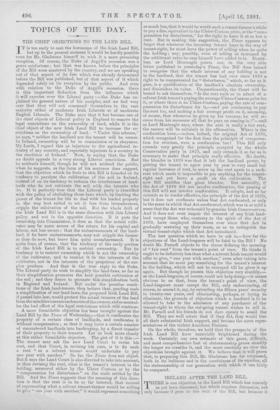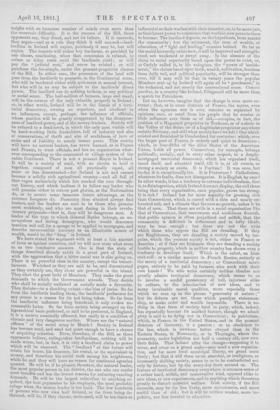IRELAND AFTER THE LAND BILL.
THERE is one objection to the Land Bill which has scarcely as yet been discussed, but which requires discussion, not only because it goes to the root of thu Bill, but because it weighs with an immense number of minds even more than the economic difficulty. It is the success of the Bill, these opponents say, they dread, and not its failure. If it succeeds, they argue—and as a rule they think it will succeed—land- lordism in Ireland will expire, painlessly it may be, but will expire. The tenants will either buy foe-farms, as provided by one clause, combining, when that concession is refused, to refuse or delay rents until the landlords yield ; or will pay the " judicial rent," and never be evicted ; or will purchase the fee-simple, under the peasant-proprietor clauses of the Bill. In either case, the possession of the land will pass from the landlords to peasants, in the Continental sense, who will be burdened either with quit-rents or annual interest, but who will in no way be subject to the landlords' direct power. The landlord can do nothing to them, in any political or social sense. The half-million of farmers, large and small, will be the owners of the only valuable property in Ireland ; or, in other words, Ireland will be in the hands of a terri- torial democracy, owning no superiors, and obedient to no influences, except, perhaps, the influence of officials, whose position will be greatly exaggerated by the disappear- ance of landlord power, and of the money-lenders. Society will be reduced to a dead-level, in which the only men visible will be hard-working little freeholders, full of industry and also of conservatism, of thrift and also of sordidness, of love of order and of liability to nearly insane panic. This society will have no natural loaders, has never learned, as in France and Prussia, to trust officials, and has no organisation what- ever corresponding to the communal or village system of the entire Continent. There is not a peasant Mayor in Ireland. It will be a society of sand, with no shrubs to hold it together, composed of men all practically equal, all more or less discontented—for Ireland is not and cannot become a solidly rich agricultural country—and all full of that vague melancholy which has marked the race through- out history, and which inclines it to follow any leader who will promise either to restore past glories, as the Nationalists do, or to secure some immense future advantage, as the extreme Leaguers do. Peasantry thus situated always find leaders, and the leaders are sure to be those who promise most recklessly, and who are most daring in their revolu- tionary proposals—that is, they will be dangerous men. A leader of the typo to which General Butler belongs, an un- scrupulous and daring demagogue, who would denounce taxation and call for a sponge to be applied to mortgages, and describe inconvertible currency as an illimitable source of wealth, would be the "king " in Ireland.
We have stated the argument with at least a fair amount of force as against ourselves, and we will now state what seem to us two conclusive answers. One is that the state of things described already exists in a great part of Ireland, with the aggravation that a bitter social war is also going on. There is no powerful class in the country, except the tenant- farmers. Wretched as they are said to be, and discontented as they certainly are, they alone are powerful in the island. They elect the great body of Members. They make the great demands to which the Government attends. They decide who shall be socially outlawed or socially made a favourite. They dictate—to a shocking extent—the bias of juries. So far from the landlords leading them, the landlords' preference for any course is a reason for its not being taken. So far from the landlords' influence being beneficial, it only evokes un- reasonable hates. So far from society being arranged on the h aararchical basis preferred, or said to be preferred, in England, it is a society nominally officered, but really in a condition of chronic and very dangerous mutiny. Where are the " natural officers " of the social army in Meath ? Society in Ireland has become sand, and sand not quiet enough to have a chance of acquiring cohesion. Even, therefore, if the Bill, as these opponents believe, extinguishes landlordism, nothing will be made worse, but, in fact, it is only a landlord claim to power which will be removed. The " landlord " of the future will retain his house, his demesne, his rental, or its equivalent in money, and therefore his social rank among his neighbours, while he and they will have no reason for continued agrarian quarrel. He will be, if he pleases, therefore, the natural leader, the most popular person in his district, the one who can confer most benefits and has the fewest reasons for enforcing exacting demands. He will bo the largest subscriber to anything re- quired, the best paymaster to his employes, the most probable refuge when the moneylender is too hard. The few hundreds of persons who now own half Ireland, so far from being de- throned, will be, if they choose, enthroned, will be ten times as influential as their warfare with their tenantry, or, to be more just, as theirlatent power to commence that warfare, now permits them to become. The landlord departs, on the hypothesis, from amidst the community ; but the aristocrat, the man of wealth, of education, of " light and leading," remains behind. So far as the social hierarchy exists now, it will be improved and strength- ened, not weakened or swept away. In the absence of the claim to social superiority based upon the power to evict, or, as Carlyle called it, in his eulogium, the " power of banish- ment," the claims based upon birth, wealth, cultivation, freedom from daily toil, and political popularity, will be stronger than ever, till it may well be that in twenty years the popular Members sent up by Ireland will again all be " gentlemen," in the technical, and not merely the conventional sense. Cceteris raribus, in a country like Ireland, Fitzgerald will be more than, a match for Patrickson.
Let us, however, imagine that the change is even more ex- treme ; that, as in some districts of France, the squire, even when the agrarian war is over, remains so separated by opinions, race, or creed from his people that he retains as little influence over them as of old,—occupies, in fact, the position of a Huguenot proprietor in Toulouse, or of a cleric in the Valley of the Seine, or of a Legitimist proprietor anywhere outside Brittany, and still what society have we left ? One which existed and flourished in Cumberland for centuries ; which, over the larger part of France, is orderly and quiet to dreariness ; which, in four-fifths of the older States of the American Union, holds all power. Connecticut, for example, belongs politically, socially, and in every other respect, to a deeply- mortgaged territorial democracy, which has organised itself, taxed itself, and educated itself, till it is, at all events, as strong a society as exists. It is Puritan I It was once, but to-day it is exceptionally lax. It is Protestant ? Catholicism, whatever its faults, does not disorganise. It is English by race ? In other words, it has a tendency to extreme individualism, that is, to disintegration, which Ireland does not display, the evil there being that every organisation, once popular, grows too strong. It is rich ? Ireland has far more capacity for growing rich than Connecticut, which is cursed with a thin and nearly ex- hausted soil, and a climate that favours no growth, unless it be that of men. That there are evils in a social organisation like that of Connecticut, that narrowness and sordidness flourish, that public opinion is often prejudiced and selfish, that the community is deficient in refinement and in lofty ideals, may be true enough ; but these are not the evils which those who oppose the Bill are dreading. If they are Englishmen, they are dreading a society moved by im- pulse, which the yeoman society is not, either in France or America ; or if they are Irishmen, they are dreading a society hostile to property, which in neither country has shown even a tendency to develope itself. Which is the safest, an Irish rent-roll ; or a similar amount in French Rentes, entirely at the mercy of a territorial democracy ; or Connecticut mort- gages, entirely to be paid by farmers who work with their own hands ? We who write certainly neither idealise nor greatly admire territorial democracy, which seems to us to involve a sordid persistency of toil, injurious alike to culture, to the introduction of new ideas, and to many invaluable moral qualities, more especially those which we sum up in the phrase " generosity of nature ;" but its defects are not those which paralyse statesman- ship, or make order and wealth impossible. There is no- thing in that form of society fatal to piety, which, indeed, has repeatedly become its marked feature, though. we admit piety is said to be dying out in Connecticut ; to patriotism, which, in France, in the United States, and in the peasant districts of Germany, is a passion ; or to obedience to the law, which is nowhere better obeyed than in the Eastern States, in Normandy, or in Thuringia, where the peasantry, under legislation not half a century old, now own their fields. That Ireland after the change—supposing it to occur, and occur on a grand scale—may need a new organisa- tion, and far more local municipal liberty, we grant most freely ; but that it will show us an anarchic, or irreligious, or incessantly shifting society, seems to us to be contradicted not only by history, but by the every-day facts around us. The
i
feature of territorial democracy everywhere is common-sense of a rather hard, selfish, and conservative kind, opposed alike to new ideas, to new experiments, and to anything which threatens greatly reatl to disturb material welfare. Irish society, if the Bill succeeds, may be far less lively, more monotonous, and more sordid than of old ; but it will be neither weaker, more im- pulsive, nor less devoted to education.



































 Previous page
Previous page